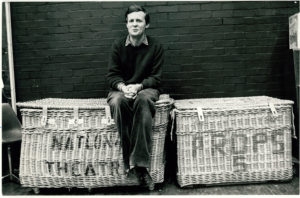In today’s Wall Street Journal “Sightings” column I sift through The Blue Touch Paper, David Hare’s recently published memoir, for clues to his distinctive approach to political theater. Here’s an excerpt.
* * *
David Hare is back—though not on Broadway. “The Judas Kiss,” his 1998 play about the travails of Oscar Wilde, is being revived at Brooklyn’s BAM Harvey Theater in a West End transfer starring Rupert Everett that seems likely to be, at the very least, a succès d’estime, if only because the Obama administration’s ukase on transgender bathrooms in public schools has just rung the media bell. No doubt Mr. Hare is thrilled by the coincidence, since he’s a political artist through and through. Witness “The Blue Touch Paper,” his recently published memoir, in which he declares himself to have been a playwright who “was always happiest when I had a cause.”
 Outside of a pair of favorable notices in the New York Times, “The Blue Touch Paper” received only modest attention when it came out in the U.S. in November. That stands to reason: Mr. Hare isn’t nearly as well known over here as he is in England. Several of his plays, most notably “The Judas Kiss,” “Plenty,” “Skylight” and “The Vertical Hour,” have been staged on Broadway, but none has been a hit. Yet his place in the annals of postwar drama is both secure and well deserved, not least because he is that rarity of rarities, a political playwright who is also a first-class artist.
Outside of a pair of favorable notices in the New York Times, “The Blue Touch Paper” received only modest attention when it came out in the U.S. in November. That stands to reason: Mr. Hare isn’t nearly as well known over here as he is in England. Several of his plays, most notably “The Judas Kiss,” “Plenty,” “Skylight” and “The Vertical Hour,” have been staged on Broadway, but none has been a hit. Yet his place in the annals of postwar drama is both secure and well deserved, not least because he is that rarity of rarities, a political playwright who is also a first-class artist.
To be sure, Mr. Hare occasionally lets his passions override his artistic judgment, as he did in 2006 with “Stuff Happens,” a coarse, smug documentary play about the Gulf War that shed no light on its subject. Far more often than not, though, he writes plays of ideas in which—like George Bernard Shaw, his eminent predecessor—he creates “villains” who are fully rounded creatures of flesh and blood….
“Using the theatre either to lecture or to parade your virtuous beliefs excludes the audience and leaves them with nothing to do,” he writes. “They hate you for it, because it insults their intelligence. Worse, it insults their experience of life. A good play is there not to close minds but to open them.”
Makes sense, right? Of course—to people who look to art to show them the world as it is. But to those for whom a play is not a potentially persuasive study of human character but a blunt instrument, Mr. Hare’s commonsense approach is anathema….
* * *
Read the whole thing here.
Laura Rook and Philip Earl Johnson in a scene from the Court Theatre’s 2013 Chicago revival of Skylight, directed by William Brown:
